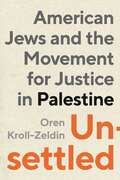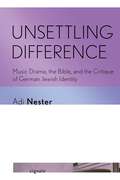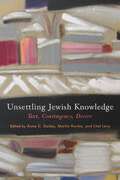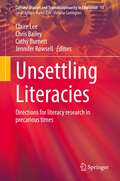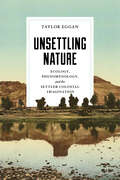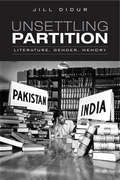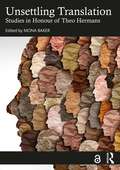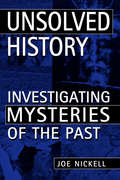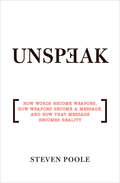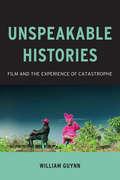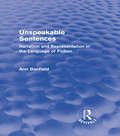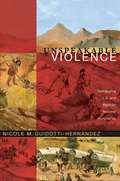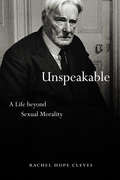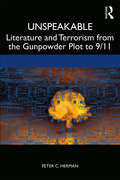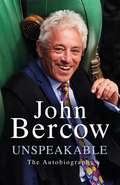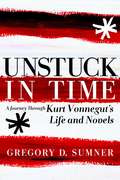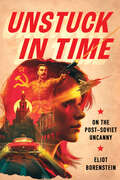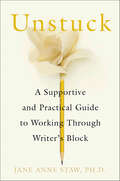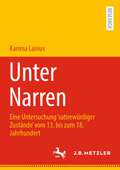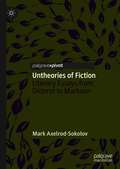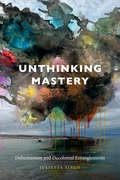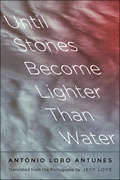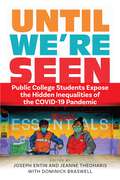- Table View
- List View
Unsettled: American Jews and the Movement for Justice in Palestine
by Professor Oren Kroll-ZeldinExamines how young Jewish Americans’ fundamentally Jewish values have led them to organize in solidarity with PalestiniansUnsettled digs into the experiences of young Jewish Americans who engage with the Palestine solidarity movement and challenge the staunch pro-Israel stance of mainstream Jewish American institutions. The book explores how these activists address Israeli government policies of occupation and apartheid, and seek to transform American Jewish institutional support for Israel.Author Oren Kroll-Zeldin identifies three key social movement strategies employed by these activists: targeting mainstream Jewish American institutions, participating in co-resistance efforts in Palestine/Israel, and engaging in Boycott, Divestment, and Sanctions (BDS) campaigns. He argues that these young people perceive their commitment to ending the occupation and Israeli apartheid as a Jewish value, deeply rooted in the changing dynamics of Jewish life in the twenty-first century. By associating social justice activism with Jewish traditions and values, these activists establish a connection between their Jewishness and their pursuit of justice for Palestinians.In a time of internal Jewish tensions and uncertainty about peace prospects between Palestine and Israel, the book provides hope that the efforts of these young Jews in the United States are pushing the political pendulum in a new direction, potentially leading to a more balanced and nuanced conversation.
Unsettling Difference: Music Drama, the Bible, and the Critique of German Jewish Identity (Signale: Modern German Letters, Cultures, and Thought)
by Adi NesterUnsettling Difference challenges the major-minor pattern that has framed discussions of German Jewish difference, focusing on instances that fall outside traditional understandings of minority culture. Exploring expressions of Jewish identity and difference in biblical-themed musical dramas and their literary sources, Adi Nester argues that the issue of Jewish difference should be treated as an aesthetic question in the first half of the twentieth century, even amid the rise of pseudoscientific theories about race and blood.Drawing on the fraught, parallel histories of opera and the modern reception of the Hebrew Bible in Germany, both significant in debates at the time about the nature of Jewish separateness, Unsettling Difference shows how this discourse troubles concepts of Jewish marginality and (non-Jewish) German dominance. Through innovative readings of key works in this tradition—Rudolf Borchardt's poem, Das Buch Joram; Paul Ben-Haim's oratorio, Joram; Arnold Schoenberg's opera, Moses und Aron; Joseph Roth's novel, Hiob; and Eric Zeisl's opera, Hiob—Nester shows how these biblical adaptations foreground alternative notions of difference that rely on confusion, ambiguity, radical heterogeneity, excess, and repetition.
Unsettling Jewish Knowledge: Text, Contingency, Desire (Jewish Culture and Contexts)
by Anne C. Dailey, Martin Kavka, and Lital LevySpanning the fields of literature, history, philosophy, and theology, Unsettling Jewish Knowledge adopts a fresh approach to the study of Jewish thought and culture. By creatively foregrounding the role of emotions, senses, and the imagination in Jewish experience, the book invites readers to consider what it means for Jewish identity and experience to be constituted outside the frameworks of reasoned thought and inquiry. The collection’s eight essays offer innovative and provocative approaches to a diverse array of topics including modern Jewish-Christian relations, the book of Isaiah, contemporary Jewish fiction, and philosophical meditations on Jewish law. Their bold interpretations of Jewish texts and histories are centered on questions of faith, loss, prejudice, and enchantment—and the darker implications of these questions. The book’s essays also illuminate the importance of desire as a key motivating force in the pursuit of knowledge. Weaving together insights from several disciplines, Unsettling Jewish Knowledge challenges us to grapple with the unexpected, the unconventional, and the uncomfortable aspects of Jewish experience and its representations.Contributors: Anne C. Dailey, John Efron, Yael S. Feldman, Galit Hasan-Rokem, Martin Kavka, Lital Levy, Shaul Magid, Eva Mroczek, Paul E. Nahme, Eli Schonfeld, Shira Stav.
Unsettling Literacies: Directions for literacy research in precarious times (Cultural Studies and Transdisciplinarity in Education #15)
by Jennifer Rowsell Chris Bailey Cathy Burnett Claire LeeThis book asks researchers what uncertainty means for literacy research, and for how literacy plays through uncertain lives. While the book is not focused only on COVID-19, it is significant that it was written in 2020-2021, when our authors’ and readers’ working and personal lives were thrown into disarray by stay-at-home orders. The book opens up new spaces for examining ways that literacy has come to matter in the world.Drawing on the reflections of international literacy researchers and important new voices, this book presents re-imagined methods and theoretical imperatives. These difficult times have surfaced new communicative practices and opened out spaces for exploration and activism, prompting re-examination of relationships between research, literacy and social justice. The book considers varied and consequential events to explore new ways to think and research literacy and to unsettle what we know and accept as fundamental to literacy research, opening ourselves up for change. It provides direction to the field of literacy studies as pressing global concerns are prompting literacy researchers to re-examine what and how they research in times of precarity.
Unsettling Nature: Ecology, Phenomenology, and the Settler Colonial Imagination (Under the Sign of Nature)
by Taylor EgganThe German poet and mystic Novalis once identified philosophy as a form of homesickness. More than two centuries later, as modernity’s displacements continue to intensify, we feel Novalis’s homesickness more than ever. Yet nowhere has a longing for home flourished more than in contemporary environmental thinking, and particularly in eco-phenomenology. If only we can reestablish our sense of material enmeshment in nature, so the logic goes, we might reverse the degradation we humans have wrought—and in saving the earth we can once again dwell in the nearness of our own being. Unsettling Nature opens with a meditation on the trouble with such ecological homecoming narratives, which bear a close resemblance to narratives of settler colonial homemaking. Taylor Eggan demonstrates that the Heideggerian strain of eco-phenomenology—along with its well-trod categories of home, dwelling, and world—produces uncanny effects in settler colonial contexts. He reads instances of nature’s defamiliarization not merely as psychological phenomena but also as symptoms of the repressed consciousness of coloniality. The book at once critiques Heidegger’s phenomenology and brings it forward through chapters on Willa Cather, D. H. Lawrence, Olive Schreiner, Doris Lessing, and J. M. Coetzee. Suggesting that alienation may in fact be "natural" to the human condition and hence something worth embracing instead of repressing, Unsettling Nature concludes with a speculative proposal to transform eco-phenomenology into "exo-phenomenology"—an experiential mode that engages deeply with the alterity of others and with the self as its own Other.
Unsettling Partition: Literature, Gender, Memory
by Jill DidurThe Partition of India in 1947 marked the birth of two modern nation-states and the end of British colonialism in South Asia. The move towards the 'two nation solution' was accompanied by an unprecedented mass migration (over twelve million people) to and from areas that would become India and Pakistan.Diverse representations of the violence that accompanied this migration (including the abduction and sexual assault of over 75,000 women) can be found in fictional, historical, autobiographical, and recent scholarly works. Unsettling Partition examines short stories, novels, testimonies, and historiography that represent women's experiences of the Partition. Counter to the move for 'recovery' that informs some historical research on testimony and fictional representations of women's Partition experiences, Jill Didur argues for an attentiveness to the literary qualities of women's narratives that interrogate and unsettle monolithic accounts of the period.Rather than attempt to seek out a 'hidden history' of this time, Didur examines how the literariness of Partition narratives undermines this possibility. Unsettling Partitions reinterprets the silences found in women's accounts of sectarian violence that accompanied Partition (sexual assault, abduction, displacement from their families) as a sign of their inability to find a language to articulate their experience without invoking metaphors of purity and pollution. Didur argues that these silences and ambiguities in women's stories should not be resolved, accounted for, translated, or recovered but understood as a critique of the project of patriarchal modernity.
Unsettling Translation: Studies in Honour of Theo Hermans
by Mona BakerThis collection engages with translation and interpreting from a diverse but complementary range of perspectives, in dialogue with the seminal work of Theo Hermans. A foundational figure in the field, Hermans’s scholarly engagement with translation spans several key areas, including history of translation, metaphor, norms, ethics, ideology, methodology, and the critical reconceptualization of the positioning of the translator and of translation itself as a social and hermeneutic practice. Those he has mentored or inspired through his lectures and pioneering publications over the years are now household names in the field, with many represented in this volume. They come together here both to critically re-examine translation as a social, political and conceptual site of negotiation and to celebrate his contributions to the field. The volume opens with an extended introduction and personal tribute by the editor, which situates Hermans’s work within the broader development of critical thinking about translation from the 1970s onward. This is followed by five parts, each addressing a theme that has been broadly taken up by Theo Hermans in his own work: translational epistemologies; historicizing translation; performing translation; centres and peripheries; and digital encounters. This is important reading for translation scholars, researchers and advanced students on courses covering key trends and theories in translation studies, and those engaging with the history of the discipline.
Unsolved History: Investigating Mysteries of the Past
by Joe NickellWhat constitutes historical truth is often subject to change. Joe Nickell demonstrates the techniques used in solving some of the world's most perplexing mysteries, such as the authenticity of Abraham Lincoln's celebrated Bixby letter, the 1913 disappearance of writer and journalist Ambrose Bierce, and the apparent real-life model for a mysterious character in a novel by Nathaniel Hawthorne. Nickell also uses newly uncovered evidence to further investigate the identity of the Nazi war criminal known as ""Ivan the Terrible.""
Unspeak: How Words Become Weapons, How Weapons Become a Message, and How That Message Becomes Reality (Books That Changed the World)
by Steven Poole“A sharply articulated, well-documented expos of the political and economic manipulation of language . . . Fans of Orwell, take heart.”—Kirkus ReviewsWhat do the phrases “pro-life,” “intelligent design,” and “the war on terror” have in common? Each of them is a name for something that smuggles in a highly charged political opinion. Words and phrases that function in this special way go by many names. Some writers call them “evaluative-descriptive terms.” Others talk of “terministic screens” or discuss the way debates are “framed.” Author Steven Poole calls them Unspeak. Unspeak represents an attempt by politicians, interest groups, and business corporations to say something without saying it, without getting into an argument and so having to justify itself. At the same time, it tries to unspeak—in the sense of erasing or silencing—any possible opposing point of view by laying a claim right at the start to only one way of looking at a problem. Recalling the vocabulary of George Orwell’s 1984, as an Unspeak phrase becomes a widely used term of public debate, it saturates the mind with one viewpoint while simultaneously makes an opposing view ever more difficult to enunciate. In this fascinating book, Poole traces modern Unspeak and reveals how the evolution of language changes the way we think.“Unspeak deserves a place in every journalist’s vocabulary.”—Slate“This book takes no word at face value, which will anger some and enlighten others, just as a book of social and linguistic commentary should.”—Publishers Weekly“As we approach yet another political campaign season, this remarkable new book examines the intersection where words and politics collide.”—Tucson Citizen
Unspeakable Histories: Film and the Experience of Catastrophe (Film and Culture Series)
by William GuynnIn Unspeakable Histories, William Guynn focuses on the sensation of encountering past events through film. Film is capable, he argues, of triggering moments of heightened awareness in which the barrier between the past and the present can fall and the reality of the past we thought lost can be momentarily rediscovered in its material being. In his readings of seven exceptional works depicting twentieth century atrocities, Guynn explores the emotional resonance that still adheres to traumatic historical events. Guynn considers dimensions of experience that historiography leaves untouched. Yaël Hersonski's A Film Unfinished (2010) deconstructs scenes from the Nazi propaganda film Das Ghetto through the testimony of ghetto survivors. Andrzej Wajda's Katyn (2007) revivifies the murder of the Polish officer corps (in which Wajda's father perished) by Stalin's security forces during the Second World War. Andrei Konchalovsky's Siberiade (1979) reimagines the turbulent history of the Soviet Union from the perspective of an isolated Siberian village. Larissa Shepitko's The Ascent (1977) evokes the existential drama Soviet partisans faced during the Nazi occupation. Patricio Guzmán's Nostalgia for the Light (2011) examines the vestiges of human experience, including the scattered remains of Pinochet's victims, alive in the aridity of the Atacama Desert. Rithy Panh's S-21 (2003) reawakens events of the Cambodian genocide through dramatic confrontation with some of its executioners, and Joshua Oppenheimer's The Act of Killing (2012) films the perpetrators of the Indonesian genocide as they restage scenes of killings and torture. Inspired by the work of Walter Benjamin, Frank Ankersmit, Joseph Mali, and Simon Schama, Guynn argues that the film medium, more immediate than language, is capable of restoring the affective dimension of historical experience, rooted in the deepest reaches of our minds.
Unspeakable Sentences: Narration and Representation in the Language of Fiction (Routledge Revivals)
by Ann BanfieldFirst published in 1982, this title grew from a series of essays on various aspects of narrative style; the result is a finished product that melds literary theory with linguistic methodology. It is argued that, where linguistic theory intersects with literary theory, it is narrative that provides the crucial ‘experiment’ for deciding between a communication and a non-communication theory of language and, by extension, of literature. Chapters discuss such areas as subjectivity in direct and indirect speech, the absence of the narrator, and the development of narrative style. With a detailed introduction to the subject, this reissue will be of value to students of linguistics and literature with a particular interest in narrative style and linguistic theory.
Unspeakable Violence: Remapping U.S. and Mexican National Imaginaries
by Nicole M. Guidotti-HernándezUnspeakable Violence addresses the epistemic and physical violence inflicted on racialized and gendered subjects in the U.S.-Mexico borderlands from the mid-nineteenth century through the early twentieth. Arguing that this violence was fundamental to U.S., Mexican, and Chicana/o nationalisms, Nicole M. Guidotti-Hernández examines the lynching of a Mexican woman in California in 1851, the Camp Grant Indian Massacre of 1871, the racism evident in the work of the anthropologist Jovita González, and the attempted genocide, between 1876 and 1907, of the Yaqui Indians in the Arizona-Sonora borderlands. Guidotti-Hernández shows that these events have been told and retold in ways that have produced particular versions of nationhood and effaced other issues. Scrutinizing stories of victimization and resistance, and celebratory narratives of mestizaje and hybridity in Chicana/o, Latina/o, and borderlands studies, she contends that by not acknowledging the racialized violence perpetrated by Mexicans, Chicanas/os, and indigenous peoples, as well as Anglos, narratives of mestizaje and resistance inadvertently privilege certain brown bodies over others. Unspeakable Violence calls for a new, transnational feminist approach to violence, gender, sexuality, race, and citizenship in the borderlands.
Unspeakable: A Life beyond Sexual Morality
by Rachel Hope ClevesThe sexual exploitation of children by adults has a long, fraught history. Yet how cultures have reacted to it is shaped by a range of forces, beliefs, and norms, like any other social phenomenon. Changes in how Anglo-American culture has understood intergenerational sex can be seen with startling clarity in the life of British writer Norman Douglas (1868–1952), who was a beloved and popular author, a friend of luminaries like Graham Greene, Aldous Huxley, and D.H. Lawrence, and an unrepentant and uncloseted pederast. Rachel Hope Cleves’s careful study opens a window onto the social history of intergenerational sex in the nineteenth and twentieth centuries, revealing how charisma, celebrity, and contemporary standards protected Douglas from punishment—until they didn’t.Unspeakable approaches Douglas as neither monster nor literary hero, but as a man who participated in an exploitative sexual subculture that was tolerated in ways we may find hard to understand. Using letters, diaries, memoirs, police records, novels, and photographs—including sources by the children Douglas encountered—Cleves identifies the cultural practices that structured pedophilic behaviors in England, Italy, and other places Douglas favored. Her book delineates how approaches to adult-child sex have changed over time and offers insight into how society can confront similar scandals today, celebrity and otherwise.
Unspeakable: Literature and Terrorism from the Gunpowder Plot to 9/11
by Peter C. HermanUnspeakable: Literature and Terrorism from the Gunpowder Plot to 9/11 explores the representation of terrorism in plays, novels, and films across the centuries. Time and time again, writers and filmmakers including William Shakespeare, Joseph Conrad, Henry James, Gillo Pontecorvo, Don DeLillo, John Updike, and Steven Spielberg refer to terrorist acts as beyond comprehension, “a deed without a name,” but they do not stop there. Instead of creating works that respond to terrorism by providing comforting narratives reassuring audiences and readers of their moral superiority and the perfidy of the terrorists, these writers and filmmakers confront the unspeakable by attempting to see the world from the terrorist’s perspective and by examining the roots of terrorist violence.
Unspeakable: The Sunday Times Bestselling Autobiography
by John BercowWhen John Bercow retired as Speaker of the House of Commons on 31 October 2019, he had become one of the most recognisable and iconoclastic figures in British politics, occupying a ringside seat during one of the most febrile periods in modern British history. In his no-holds-barred memoir, he offers verdicts on the leading figures of his era - from Tony Blair to David Cameron, Theresa May to Boris Johnson, and charts his extraordinary political journey. UNSPEAKABLE is essential reading for anyone interested in politics and how our democracy is - or should be - run.
Unspeakable: The Sunday Times Bestselling Autobiography
by John BercowWhen John Bercow retired as Speaker of the House of Commons on 31 October 2019, he had become one of the most recognisable and iconoclastic figures in British politics, occupying a ringside seat during one of the most febrile periods in modern British history. In his no-holds-barred memoir, he offers verdicts on the leading figures of his era - from Tony Blair to David Cameron, Theresa May to Boris Johnson, and charts his extraordinary political journey. UNSPEAKABLE is essential reading for anyone interested in politics and how our democracy is - or should be - run.
Unstuck in Time: A Journey Through Kurt Vonnegut's Life and Novels
by Gregory D. SumnerIn Unstuck in Time, Gregory Sumner guides us, with insight and passion, through a biography of fifteen of Kurt Vonnegut's best known works, his fourteen novels starting with Player Piano (1952) all the way to an epilogue on his last book, A Man Without a Country (2005), to illustrate the quintessential American writer's profound engagement with the "American Dream" in its various forms. Sumner gives us a poignant portrait of Vonnegut and his resistance to celebrating the traditional values associated with the American Dream: grandiose ambition, unbridled material success, rugged individualism, and "winners" over "losers." Instead of a celebration of these values, we read and share Vonnegut's outrage, his brokenhearted empathy for those who struggle under the ethos of survival-of-the-fittest in the frontier mentality--something he once memorably described as "an impossibly tough-minded experiment in loneliness." Heroic and tragic, Vonnegut's novels reflect the pain of his own life's experiences, relieved by small acts of kindness, friendship, and love that exemplify another way of living, another sort of human utopia, an alternative American Dream, and the reason we always return to his books.
Unstuck in Time: On the Post-Soviet Uncanny
by Eliot BorensteinToday's Russia, Unstuck in Time suggests, is a nation of time travelers, living either in memories of the Great Patriotic War and a society that provided for all its citizens or in an alternative future in which the USSR never collapsed. Eliot Borenstein examines the ways in which films, fiction, television, social media, political parties, and even theme parks use the conventions of time travel and alternate history to fantasize about narratives that are more appealing than the post-Soviet present.Unstuck in Time explores the centrality of an uncannily persistent USSR in the post-Soviet cultural imagination through deeply engaged and entertaining readings of an impressive array of texts: fantasies in which characters time-crash into the Soviet past, fictions of triumphant far-future Soviet societies, and real-life enterprises feeding the belief that the Soviet Union never ended. Whether channeled into benign nostalgia or dangerous mythmaking, the cases that Borenstein analyzes reveal the extent to which the psychic shock of the end of the Soviet Union left Russians adrift, caught between a past many still long for and a future few can imagine.
Unstuck: A Supportive and Practical Guide to Working Through Writer's Block
by Jane Anne StawNone of us is immune to writer's block. From well-known novelists to students, associates in business and law firms, and even those who struggle to sit down to write personal correspondence or journal entries -- everyone who writes has experienced either brief moments or longer periods when the words simply won't come. In Unstuck, poet, author and writing coach Jane Anne Staw uncovers the reasons we get blocked - from practical to emotional, and many in between - and offers powerful ways to get writing again. Based on her experiences working with writers as well as her own struggle with writer's block, Staw provides comfort and encouragement, along with effective strategies for working through this common yet vexing problem.Topics include: understanding what's behind the block * handling anxiety and fear * carving out time and space to write * clearing out old beliefs and doubts * techniques to relax and begin * managing your expectations as well as those of family and friends * experimenting with genre, voice, and subject matter * defusing the emotional traps that sabotage progress and success * ending the struggle and regaining confidence and freedom by finding your true voice - and using it. Writers of all levels will find solace, support, and help in this book, leading them to an even deeper connection with their work and more productivity on the page.
Unter Narren: Eine Untersuchung ‘satirewürdiger Zustände’ vom 13. bis zum 18. Jahrhundert
by Karima LaniusDie Studie analysiert ausgewählte deutschsprachige Satiren, die Figuren des Narren enthalten und den Zeitraum vom 13. bis zum 18. Jahrhundert widerspiegeln. Dadurch sollen der Forschung neue Vorschläge gemacht werden, wie die Satire erfasst werden kann. Die Untersuchung orientiert sich an den Satiretheorien von Ulrich Gaier und Jörg Schönert sowie an der Systemtheorie Niklas Luhmanns. Im Zentrum stehen folgende Satiren: Helmbrecht (um 1250–1280), Des Teufels Netz (um 1414–1420), Das Narrenschiff (1494), Der Abentheuerliche Simplicissimus Teutsch (1668/9), Geheime Nachricht von D. Jonathan Swifts letztem Willen (1751–1755) und Das Leben Junker Hansens, eines Landelmanns (1760). Auf der Basis der vergleichenden Analyse dieser Satiren werden folgende Konstanten für das Satireverständnis gewonnen: 1. Zweckgerichtetheit und Moral, 2. bildungsbedürftiger Mensch und gesellschaftliche Ordnung, 3. Aggression/Negativierung bzw. Missachtung/Verachtung und 4. satirische Markierung.
Untheories of Fiction: Literary Essays from Diderot to Markson
by Mark Axelrod-SokolovThis book takes a closer look at the diversity of fiction writing from Diderot to Markson and by so doing call into question the notion of a singular “theory of fiction,” especially in relation to the novel. Unlike Forster’s approach to “Aspects of the Novel,” which implied there is only one kind of novel to which there may be an aspect, this book deconstructs how one approach to studying something as protean as the novel cannot be accomplished. To that end, the text uses Diderot’s This Is Not A Story (1772) and David Markson’s This Is Not A Novel (2016) as a frame and imbedded within are essays on De Maistre’s Voyage Around My Room (1829), Machado de Assis’s Posthumous Memoirs Of Braz Cubas (1881), André Breton’s Nadja (1928) and Elizabeth Smart’s By Grand Central Station I Sat Down And Wept (1945).
Unthinking Mastery: Dehumanism and Decolonial Entanglements
by Julietta SinghIn Unthinking Mastery Julietta Singh challenges a core, fraught dimension of geopolitical, cultural, and scholarly endeavor: the drive toward mastery over the self and others. Drawing on postcolonial theory, queer theory, new materialism, and animal studies, Singh traces how pervasive the concept of mastery has been to modern politics and anticolonial movements. She juxtaposes destructive uses of mastery, such as the colonial domination of bodies, against more laudable forms, such as intellectual and linguistic mastery, to underscore how the concept—regardless of its use—is rooted in histories of violence and the wielding of power. For anticolonial thinkers like Fanon and Gandhi, forms of bodily mastery were considered to be the key to a decolonial future. Yet as Singh demonstrates, their advocacy for mastery unintentionally reinforced colonial logics. In readings of postcolonial literature by J. M. Coetzee, Mahasweta Devi, Indra Sinha, and Jamaica Kincaid, Singh suggests that only by moving beyond the compulsive desire to become masterful human subjects can we disentangle ourselves from the legacies of violence and fantasies of invulnerability that lead us to hurt other humans, animals, and the environment.
Until Stones Become Lighter Than Water (The Margellos World Republic of Letters)
by António Lobo AntunesA novel about the horrors of war and its aftermath from one of Europe’s most brilliant authors Award‑winning author António Lobo Antunes returns to the subject of the Portuguese colonial war in Angola with a vigorous account of atrocity and vengeance. Drawing on his own bitter experience as a soldier stationed for twenty‑seven months in Angola, Lobo Antunes tells the story of a young African boy who is brought to Portugal by one of the soldiers who destroyed the child’s village, and of the boy’s subsequent brutal murder of this adoptive father figure at a ritual pig killing. Deftly framing the events through an assembly of interwoven narratives and perspectives, this is one of Lobo Antunes’s most captivating and experimental books. It is also a timely consideration of the lingering wounds that remain from the conflict between European expansionism and its colonized victims who were forced to accept the norms of a supposedly superior culture.
Until We Are Strong Together: Women Writers In The Tenderloin (Language And Literacy Ser.)
by Caroline HellerIn her extraordinary book about the members of the Tenderloin Women Writers Workshop, Caroline Heller witnesses the power of literacy in the lives of these women who gathered weekly in one of San Francisco's roughest neighborhoods, to share their writing and life experiences. In telling their stories as she came to know them during her three years of attendance. Heller brings the group to life and explores the functions the workshop served for its participant, functions that were social, political, and deeply educational. Her eloquent narrative contributes a fresh conception of critical literacy and liberation education, drawing on the words and perceptions of some of those outside the mainstream of American life, enriching our understanding of how we might more effectively learn in community with one anothe, and how to connect writing to real life, to our neighborhood, and to social justice and social change.
Until We're Seen: Public College Students Expose the Hidden Inequalities of the COVID-19 Pandemic (Contemporary Ethnography)
by Joseph Entin and Jeanne Theoharis with Dominick BraswellFirsthand accounts of COVID-19’s devastating effects on working-class communities of colorThe first months of the COVID-19 pandemic were filled with talk of heroes, the frontline workers who kept the country functioning. “And when they write those history books, the heroes of the battle will be the hardworking families of New York,” Governor Andrew Cuomo trumpeted on Labor Day 2020. But what if those heroes, those essential workers and their families, wrote the book themselves?In Until We’re Seen, the heroes write their own stories. Through firsthand accounts by college students at Brooklyn College and California State University Los Angeles, Until We’re Seen chronicles COVID-19’s devastating, disproportionate effects on working-class communities of color, even as the United States has declared the pandemic over and looks away from its impacts.Very few of these students and their families had the luxury of laboring from home; if they were able to keep their jobs, they took subways and buses, and they worked. They drove delivery trucks, worked in private homes, cooked food in restaurants for people to pick up, worked as EMTs, and did construction. They couldn’t escape to second homes; if anything, more people moved in, as families were forced to consolidate to save money. Together, the accounts in this book show that the COVID-19 pandemic did discriminate, following the race and class fissures endemic to US society. But if these are tales of hardship, they are also love stories—of students’ families, biological and chosen—and of the deep resolve, mundane carework, and herculean efforts such love entails.Recounting 2020–2022 through the experiences of predominantly young, working-class immigrants and people of color living in the first two major US COVID-19 epicenters, Until We’re Seen spotlights previously untold stories of the pandemic in New York, Los Angeles, and the nation as a whole.
